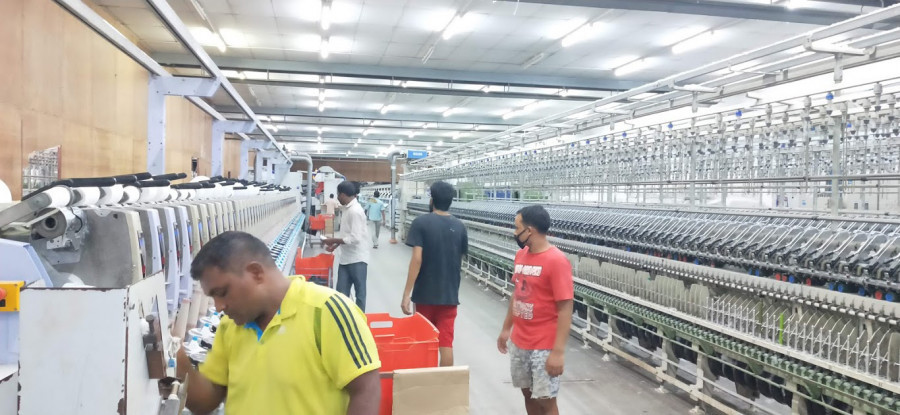Money
Factories face shortages of raw materials as prohibitory order cuts supply lines
Entrepreneurs say they can handle a short period of immobility, but worry the lockdown may be prolonged.
Madhav Dhungana
Factories in western Nepal are having a hard time getting raw materials to keep their machines running, and they say they are alarmingly low on inventory.
The prohibitory order issued by the provincial government has hit transportation services in Bhairahawa and nearby areas and disrupted supply lines. Traders and industrialists say they can handle a short period of immobility, but they are worried the lockdown may be prolonged.
Business and industry associations say they are ready to operate the factories and manufacture goods by following strict health protocols set by the government, but storage has become a problem with unsold inventory piling up as the markets and shops are closed completely.
They are asking how long they are supposed to store the finished products in their warehouses and feed and house hundreds of workers on the factory premises.
The local government has permitted factories to operate provided they keep their workers indoors.
Rajesh Agrawal, managing director of the Siddhartha Industrial Group and central member of the Federation of Nepalese Chambers of Commerce and Industry, said that it had become difficult to keep the factories running due to the prohibitory order which has strangled the supply chain.
"We have a responsibility to keep the factories running by adhering to the safety standards set by the government," he said. “Otherwise the market may face shortages of goods in the middle of the pandemic.”
But only around 80 percent of the factories will be able to remain open under the existing health protocols fixed by the government. The rest don't have enough space to accommodate the workers and store the manufactured goods, he said.
The government has set several conditions for operating factories during the prohibitory period which include keeping all employees on the premises and feeding and housing them, maintaining physical distance between people, checking the health of all workers daily for fever, and using masks and sanitisers. In case workers become infected, they should be put in isolation.
Bidur Dhungana, general secretary of the Western Cement Producers' Association and general manager of Jagdamba Cement Industry, said they were operating the factory by keeping all workers within the plant compound.
"But there are many problems as the government has not allowed transportation. Besides, factories are facing a shortage of labour," he said. “We decided to face the problem for a few days as it helps to prevent the spread of Covid-19,” he said. “But if the situation prolongs, it will become difficult.”
During last year's lockdown, domestic factories suffered labour shortages for a long time as their Indian workers returned to their homes, he added.
Companies have been providing training to local workers. Nepali migrant workers who returned home during last year's lockdown also received training after getting jobs at local factories.
Dhungana said that things were easier this year for factory owners as the local workers they have hired had not left for foreign jobs. He said there was no labour shortage this time. "We don’t have to shut down the factory for lack of workers," he said.
The Bhairahawa-Lumbini corridor contains 26 factories. They include cement, synthetics, steel, paper and plywood plants, and spinning and grain mills. They employ around 5,000 workers.
Besides, there are about five dozen factories at the Bhairahawa-Parasi and Bhairahawa-Butwal industrial corridors. There are 11 steel factories in operation in Rupandehi, Nawalparasi and Kapilvastu.
Local workers from Dhakdhahi, Marchwar, Suryapura and Lumbini areas used to travel daily to work at the cement and steel factories in Rupandehi. Now it is not easy to commute to the factory due to the travel restriction.
"The prohibitory order has not had a big impact on industry so far, and entrepreneurs are ready to bear the minor hardships at a time when the country is fighting the Covid-19 pandemic," said Kul Prasad Neupane, immediate past of the Siddhartha Chamber of Commerce and Industry.
"Industrialists are ready to operate their factories by respecting the restrictions and following the health protocols," he said. "If the prohibitory order is extended and problems arise, entrepreneurs will move ahead by coordinating with the local administration."




 13.12°C Kathmandu
13.12°C Kathmandu













